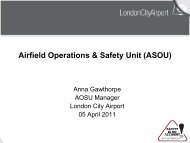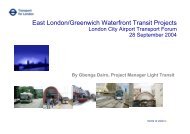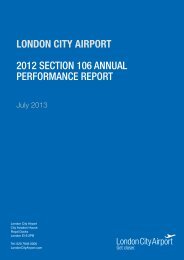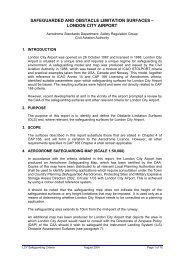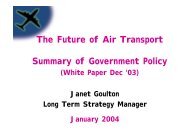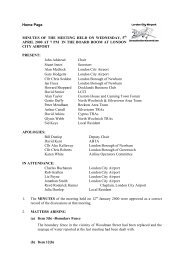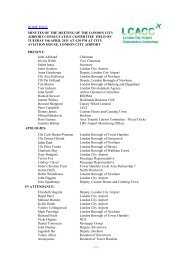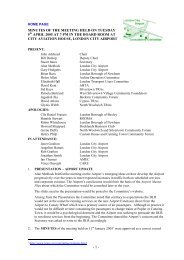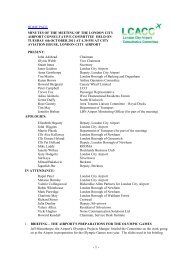The Mayor's Ambient Noise Strategy - Greater London Authority
The Mayor's Ambient Noise Strategy - Greater London Authority
The Mayor's Ambient Noise Strategy - Greater London Authority
Create successful ePaper yourself
Turn your PDF publications into a flip-book with our unique Google optimized e-Paper software.
166 Mayor of <strong>London</strong><br />
<strong>The</strong> Mayor’s <strong>Ambient</strong> <strong>Noise</strong> <strong>Strategy</strong><br />
noise-sensitive uses nearby. Planning briefs, conditions, agreements or<br />
other mechanisms should be used to protect incomers, including through<br />
contributions to noise reduction at source.<br />
policy 65<br />
<strong>The</strong> Mayor will encourage the <strong>London</strong> Development Agency to identify,<br />
through existing manufacturing networks, any shared problems related<br />
to noise and vibration, and, where relevant, bring forward proposals<br />
through the Production Industries Commission to promote good practice<br />
in noise management.<br />
Economic development potential<br />
4E.22 <strong>The</strong> noise and vibration control sector is relatively small, compared with<br />
those dealing with air pollution, water treatment and solid wastes. A<br />
national survey of environmental protection expenditure, involving 7,400<br />
companies in extraction, manufacturing, energy and water supply industries,<br />
was carried out in 2001. 12 This indicated capital expenditure on noise and<br />
vibration control of £98 million in 2001, or 9% of the environmental<br />
protection total. Operating expenditure on noise in the same year<br />
amounted to £22 million, or 1% of the total. <strong>The</strong> <strong>London</strong> Development<br />
Agency has conducted an audit of the environmental business sector, in the<br />
context of promoting green jobs. This included business support<br />
infrastructure and relevant university research centres. <strong>The</strong> aim was to<br />
identify key issues for the sector as a whole. <strong>The</strong> study will inform future<br />
LDA priorities in developing the sector. For instance, a future study of the<br />
economic development potential of businesses engaged in sound insulation<br />
and noise control could identify capacity, areas of innovation, supply chains,<br />
factors governing demand, and economic growth and employment<br />
potential. <strong>The</strong> <strong>London</strong> Hydrogen Partnership will be examining pathways to<br />
fuel cells, which offer scope for noise reduction in many applications.<br />
policy 66<br />
<strong>The</strong> Mayor will encourage the <strong>London</strong> Development Agency, as resources<br />
allow, to examine the economic development potential of businesses<br />
engaged in sound insulation and noise control, with an initial focus on<br />
sustainable design and construction, and including potential employment<br />
in deprived areas.<br />
Aggregates<br />
4E.23 Advice on minimising noise from aggregates operations is contained in<br />
MPG 11: <strong>The</strong> Control of <strong>Noise</strong> at Surface Mineral Workings. 13<br />
Safeguarding river wharves 14 and retaining well-sited railheads are<br />
particularly important for the sustainable transport of aggregates, which<br />
will be needed to support <strong>London</strong>’s development. Operational noise<br />
should be minimised, but cannot be entirely eliminated. Established use<br />
does not provide protection against action under nuisance legislation. <strong>The</strong>



